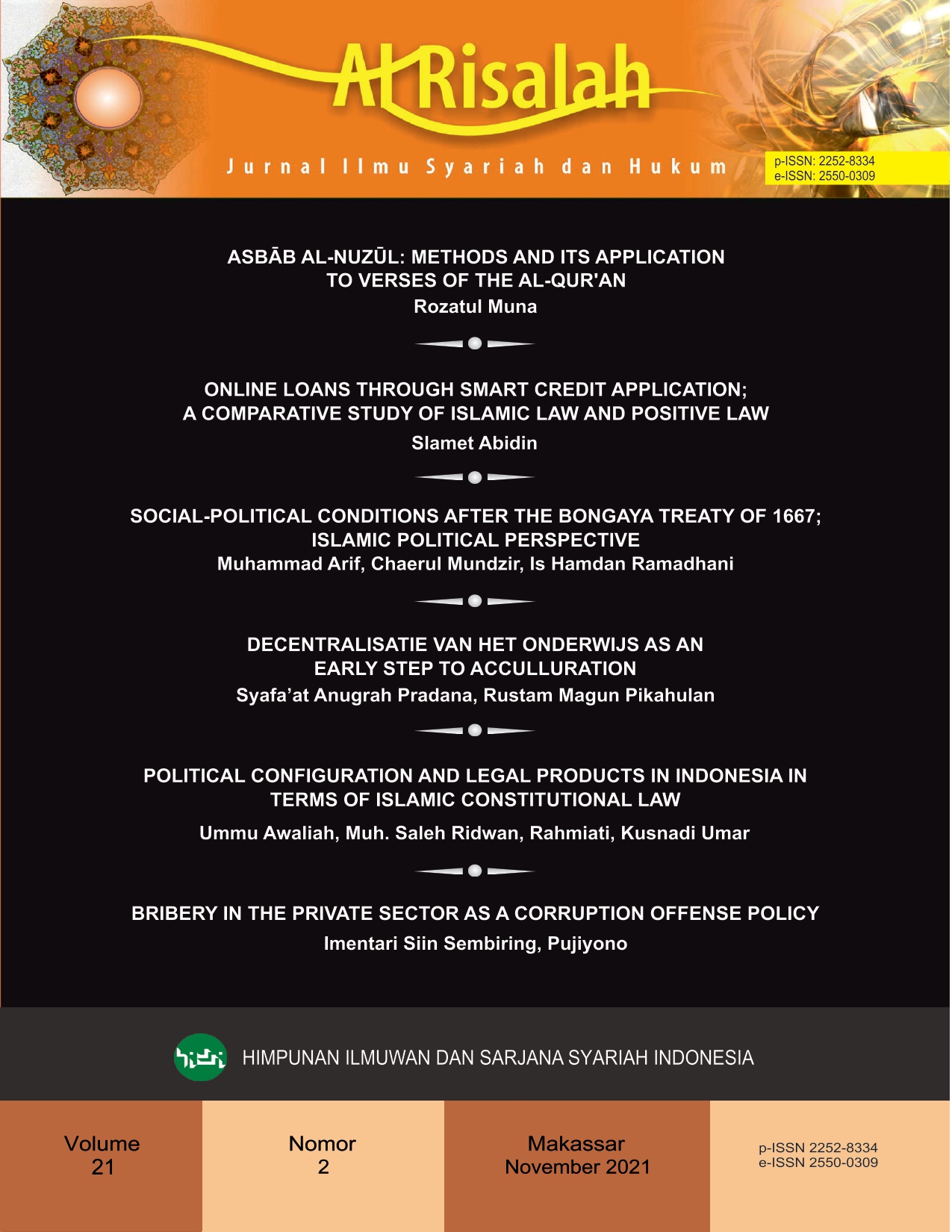ONLINE LOANS THROUGH SMART CREDIT APPLICATION; A COMPARATIVE STUDY OF ISLAMIC LAW AND POSITIVE LAW
Abstrak
This article aimed to describe and analyze the comparison of the two laws, namely Islamic Law and Positive Law, regarding online loans in the Smart Credit application. This study was a literature study using a qualitative design that was the basis for library research by exploring the postulates of Islamic law and articles of positive law that were directly related to the object studied and analyzing and concluding the comparison of the two laws. The results of this study indicated that the legal requirements for online loans in the Smart Credit application was based on the provisions of Islamic Law and Civil Code. In addition, according to Islamic Law and Positive Law, the online loan mechanism through the Smart Credit application had differences, including in Islamic Law allowing online loans. However, if the loans process used usury or interest, Islamic law forbade the lender. While the Positive Law, in this case, was contained in Article 1320 of the Civil Code, which explained that if a lender has agreed to the process of terms and conditions that the Smart Credit application has made and has bound himself in the applicable provisions, whether a loan that was known to have an interest or a delay in paying would be given a fine, then the loans process was legal in the eyes of the law. This was because they have tied themselves to the online loan process, the Smart Credit application. This study implies that online loans are allowed to be used by the public. However, people must remain careful in using online loan applications that lend funds because the interest from lending these funds is very high and will result in very large losses.
Referensi
Ascaya, Akad dan Produk Bank Syari’ah ( Jakarta: Grafindo Persada, 2008), h. 14.
Antonio Muhammad Syafi’i, Bank Syariah dari Teori ke Praktik. Jakarta: Gema Insani,
Danesi Marcel, Pengantar Memahami Semiotika Media, Cet 1;Yogyakarta: Jalasutra, 2010
Kementerian Agama Republik Indonesia, al-Qur’an dan Terjemahnya
Ghazali Rahman Ahmad, Fiqhi Muammalah, Jakarta: Kencana Pernada Media Group,
Harun Nasrun, Fiqhi Muammalah, Jakarta: Gaya Media Pratama, 2016
Hakim Atang Abd , Fiqhi Perbankan Syariah, Bandung: Refika Aditama, 2011
Kementrian Agama RI, al-Qur’an dan Terjemahannya
Kredit Pintar, Situs Resmi Kredit Pintar. Https://www.kreditpintar.com (Diakses 28 Juli
M. Ramli Ahma, Cyber Law dan HAKI dalam Sistem Hukum Islam Indonesia, Jakarta:
Radika Aditama, 2004
Muslim Abu Husain ibn al-Hajjaj ibn, Shahih Muslim, Juz II; Beirut: dar al-Fikr, 2002
Mulich Ahmad Wardi, Hukum Fiqhi Muammalat, Cet IV; Jakarta: Amzah, 2017
Republik Indonesia, Kitab Undang-Undang Hukum Perdata, Cet. I; Jakarta: 2014
Ridwan dan Khairandi, Hukum Kontrak Indonesia, Cet. I; Uogyakarta, FH Press, 2016
Rukaya and Istiqamah, “Fenomena Perampasan Barang Pemilik Hutang Oleh Rentenir
Di Kecamatan Bontoramba Kabupaten Jeneponto; Analisis Perbandingan Hukum
Islam dan Hukum Positif”, Shautuna; Jurnal Ilmiah Perbandingan Mazhab 2, no. 1
(Januari2021),http://journal.uinalauddin.ac.id/index.php/shautuna/article/view
/17738 (Diakses 05 Mei 2021)
Salim, Hukum Kontrak, Bandung: PT. Citra Aditya Bakti, 2016
Shomad Abd, Hukum Islam Penormaan Prinsip Syariah dalam Hukum Indonesia,
Jakarta: Kencana, 2017
Wijaya Abdi, “Hukum Islam dan Sengketa Ekonomi Syari’ah (Telaah UU No. 3/2006 dan
UU No. 50/2009)”, Al-Qadau 1, no. 1 (Juni 2018),
http://103.55.216.56/index.php/al-qadau/article/view/2636 (Diakses 15 Mei
##submission.copyrightStatement##
##submission.license.cc.by-nc4.footer##

